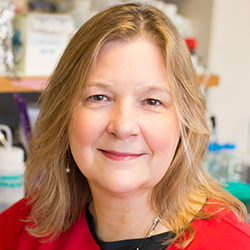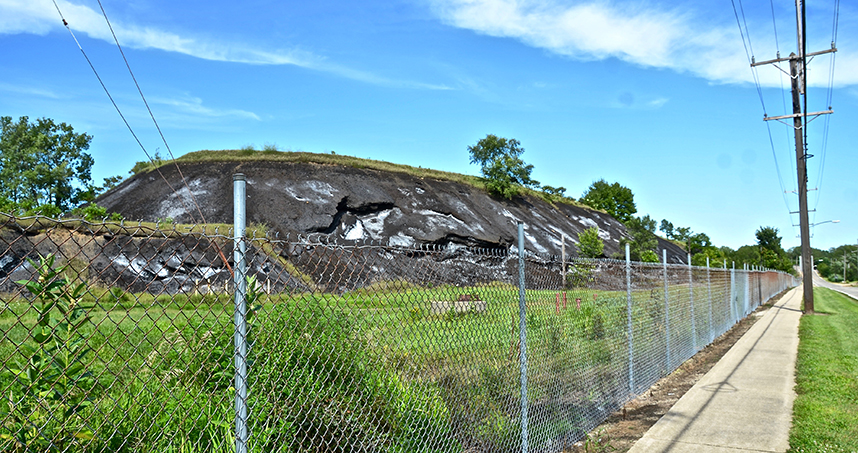A Plan to Clean Up DePue: Academia Meets Advocacy
Kimberly Gray and her students analyzed soil samples from the contaminated town
This article was originally published by the Institute for Sustainability and Energy at Northwestern (ISEN).
For more than 20 years, the citizens of DePue, Illinois — a relatively quiet town about 100 miles southwest of Chicago—have been engaged in an environmental legal battle with some of the largest corporations in the United States. The Environmental Advocacy Center (EAC) at Northwestern’s Pritzker School of Law has represented the community members since 2010 and is determined to see the remediation of the contamination sites in support of the health and well-being of residents. To support its advocacy work in DePue, the EAC is leveraging academic expertise from across the University — ranging from chemistry to journalism. And the center has made marked progress in recent months: a clean-up plan for a large residential zone in DePue may be on the horizon.
“After all these years, we finally have a proposed clean-up plan for a sizable residential area of DePue,” said Nancy Loeb, director of the EAC. “We’re talking about high levels of heavy metals such as arsenic, lead, mercury, zinc, and cadmium. There are hundreds of kids living in this community who play in parks and baseball fields that have never been remediated. It’s alarming to say the least.”
"We looked at sediment contamination in the lake and on-site soil contamination in reports. Low-income communities like DePue often don't have the financial capacity to negotiate favorable incomes." — Kimberly Gray
Reports of toxins in DePue first arose in the mid-1990s when residents and the state of Illinois began to raise concerns. The sources of the contaminants were a zinc smelting facility (closed in 1990) and fertilizer plant (closed in 1991). Although no longer producing goods, the industrial sites currently remain under the ownership of Viacomm/CBS Operations and ExxonMobil, respectively. In 1995, the Illinois Environmental Protection Agency (IL-EPA), as represented by the Illinois Office of the Attorney General, signed a consent order with Viacomm/CBS Operations and ExxonMobil requiring an environmental study of the area in order to assess the level of contamination and the risk to residents. In 1999, the federal government declared DePue a “superfund site”— adding the village to the list of nearly 1,800 contaminated sites throughout the country that are on the U.S. Environmental Protection Agency’s (US-EPA) National Priorities List for cleanup. Yet until recently, IL-EPA, Viacomm/CBS Operations, and ExxonMobil have made little progress in DePue.
The relationship between Northwestern's EAC and DePue began in 2010 when a former resident visited the village and was alarmed to see that virtually nothing had been cleaned up since the order was issued in 1995. He reached out to the EAC for help.
“This was the first big project that the EAC took in-house, and it helped set the precedent for the types of projects we work on,” Loeb said. “For the most part, DePue is a low-income community. How are they supposed to stand up to these large companies and their lawyers?”
According to U.S. Census Bureau estimates, 48 percent of households in DePue make less than $35,000 per year, with only 9 percent of residents holding a bachelor’s degree or greater.
To aid in the organization of the cleanup, IL-EPA has broken DePue into five zones—known as “Operable Units.” Released in June 2016, IL-EPA’s proposed clean-up plan seeks to remediate Operable Unit Four, a zone that encompasses a large portion of the residential buildings, parks, and schools in the village. The proposed plan, which is the first one that directly addresses residential areas, was the result of pressure from the EAC and other advocacy stakeholders.
“The proposed plan has some deficiencies that we hope IL-EPA will correct in the final iteration. But it’s certainly an important step,” said Loeb. “We’ve helped give a voice to the people in DePue and have gotten them a seat at the table, which they didn’t have before. But we haven’t gone at this alone. The EAC has also had a lot of support along the way.”
Cross-Campus Involvement for DePue
Some of that support has come from the Northwestern community, where the EAC has leveraged the expertise of several other academic programs at the university including Northwestern’s Department of Civil and Environmental Engineering, Department of Chemistry, Pritzker School of Law, and Medill School of Journalism, Media, and Integrated Marketing Communications. Faculty and students have aided the EAC in its legal advocacy as well as in reviewing reports that have emerged in the case, which are often quite technical.
 Kimberly Gray, Department Chair and Professor of Civil and Environmental Engineering, and a team of environmental engineering students enrolled in her experiential learning course CIV-ENV 398: Community-Based Design have aided the EAC in analyzing soil sample report findings.
Kimberly Gray, Department Chair and Professor of Civil and Environmental Engineering, and a team of environmental engineering students enrolled in her experiential learning course CIV-ENV 398: Community-Based Design have aided the EAC in analyzing soil sample report findings.
“We looked at sediment contamination in the lake and on-site soil contamination in reports,” Gray said. “Low-income communities like DePue often don’t have the financial capacity to negotiate favorable outcomes. Partnerships like the one we made with the EAC not only provide these communities with expertise, but they also provide benefits to our students by allowing them to engage with the messiness of real-life environmental cases. It forces students to put scientific investigation into the broader context of public policy concerns.”
The EAC has also leveraged the expertise of Franz Geiger, a professor in Northwestern’s Department of Chemistry, and a team of student researchers to gain a better understanding of the extent of the contamination. Geiger’s efforts have also communicated important information to residents in DePue.
“The average citizen in DePue wasn’t going to be able to do anything with the data the EAC obtained from the responsible parties. It was dense and not easily accessible,” said Geiger.
To help with the project, Geiger hired undergraduate students and worked with a PhD student on a National Science Foundation Fellowship to analyze data from the reports. The team used the data to create a website for the people of DePue (www.cleanupdepue.org) and incorporated an interactive map showing the location of contamination sites throughout the community. Geiger also connected the EAC with Groundswell, a nonprofit that makes films to spur social change, which put together several mini-documentaries to help tell the residents’ stories.
In Northwestern’s Pritzker School of Law, the EAC works with Andrea Hill, a law student who is simultaneously pursuing a PhD in Environmental Engineering. Hill joined the EAC in summer 2016 and will continue working with the center in the fall. Her background has been a valuable asset in the legal proceedings in DePue.
“As a student at the EAC, my first task was to write draft comments in response to IL-EPA’s proposed remediation plan, which unfortunately is likely inadequate when it comes to protecting DePue residents against unsafe levels of risk,” said Hill. “Working with the EAC has given me a unique opportunity to put past knowledge and research to use in a real-world legal context to help a community in need. Such hands-on experience has been eye opening. You learn very quickly that the real world does not operate like textbooks, law books, and statutes would lead you to believe.”
At the Medill School of Journalism, Media, and Integrated Marketing Communications, the EAC has been working closely with graduate students in the Health, Environment and Science Program. As a student journalist, Kevin Stark (Medill ’16) helped shine light on issues in DePue:
“The EAC is obviously so invested in what’s happening in DePue. Unfortunately, the media hasn’t been as involved as they should be,” he said. “As a student, I was given access to a broad range of communications contacts in DePue, which helped me stay committed to writing about what is occurring there. Medill has the unique opportunity to show how public policy is influencing real people’s lives. It’s a great example of an institution that’s not isolating itself and its ideas but is instead trying to use its resources to affect change in some way. DePue needs to be cleaned up. The responsible parties have committed to doing the work. It needs to happen.”
Despite the lengthy legal battle, Northwestern’s EAC shows no signs of slowing down.
“At the end of the day, we’re talking about families—many of them with children—whose yards and parks are coated with poisonous heavy metals,” Loeb said. “Viacomm/CBS Operations has about 30 similar contamination sites around the country, and they don’t want any legal precedent that holds them fully accountable for cleanup. They’re fighting us tooth and nail in Illinois. The people of DePue deserve better, and we aim to make sure their voices are heard.”
